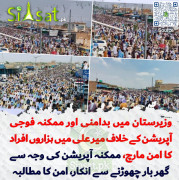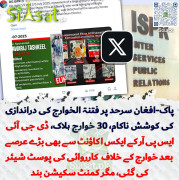mohib
Senator (1k+ posts)
Wg Cdr (rtd) Fardad Ali Shah
'Democracy' as originally conceived, was a noble idea of establishing a government 'of the people', 'by the people' and 'for the people'. Over the years this concept has been badly mutilated and as it stands today, democracy miserably fails in qualifying as the system delivering its primary objective. Even the most (relatively) progressive countries practicing democracy like the US, Britain etc could do much better with Meritocracy instead of democracy as their system.
In Pakistan the slogan of democracy has proved a total farce. This sham system as it exists today has paved the way for degeneration of institutions, rampancy of corruption, exploitation of the poor people, invitation to unholy military interventions, and promotion of disillusionment and despondency.
The fault lies in the system, because, in it, only the resourceful and the well connected are able to clinch public offices regardless of posession of requisite capabilities. Can the brightest individual having full flair for public representation but lacking financial 'resources ever think of becoming the president of the country or an MNA or for that matter even a local councilor? It is beyond the imagination of middle class people no matter how capable they may be, to even dream of contesting elections against juggernauts supported by huge coffers and mafias which are a product of the present democratic system. For the professional politicians of today's democracy, love for the people starts a month before elections and ends with the polling day.
So what is the answer ? The answer is simple.. It is the adoption of a new system called 'Meritocracy'.
In this system there are no elections. Public representatives from the President down to the local councilor are selected through competitive exams specially formulated for each position. In this way equal opportunity is provided to all, regardless of his/her financial position or association with a political party.
'Meritocracy' is simple, practicable and fair. In the proposed system of meritocracy elaborate examinations are held for each position which should encompass all requirements for the job ,to the extent of including personality tests, psychological tests scrutinising the traits of loyalty, honesty etc to select the best person amongst the applicants.
Advantages of Meritocracy;
1. It would revolutionise how we view things. The rule of merit would trickle down to the lowest level and bring about revolutionary development in all institutions.
2. As education and capability would be the sole criteria to clinch the highest office in the country, all including the poorest would pay full attention to the education and grooming of their children as the incentive is so high. Naturally, the general standard of Education in the country would improve by default.
3. A person thus selected on Merit would also want others working under him to be selected on merit too, thus the improvement can be well imagined.
4. Because the person has been selected on merit and does not owe his position to any political dispensation, he will not succumb to pressures to breach merit or do unsuitable things.
5. The person so selected as public representative can work diligently and whole heartedly for the collective development of his area without being influenced or pressurised by 'party workers' or supporters who had voted for him to victory, as is a very big nuisance in today's democratic system.
6. After expiry of the term of office, the incumbent can again appear for the competitive exam along with new contenders, and try again which neans the person will have to be on his toes where merit is concerned and will have to face ever present challenge from emerging competition, or else be replaced by an even more capable person.
7. A person selected through Meritocracy, whether for the office of President of Pakistan or a local councilor in a village, would enjoy the confidence of the people purely because he has earned that position on merit and not because of any unfair advantage like belonging to a political family, having lots of money or having sponsorship of mafias, groups etc.
Pakistan has been experimenting 'Democracy' and 'Militarocracy' alternately for the last six decades. Have we reached any where? Do we hope to reach any where with this system? The answer is obviously "No". Same pawns -only sometimes black and some times white are in play all the time. We need to change the game now.
'Democracy' as originally conceived, was a noble idea of establishing a government 'of the people', 'by the people' and 'for the people'. Over the years this concept has been badly mutilated and as it stands today, democracy miserably fails in qualifying as the system delivering its primary objective. Even the most (relatively) progressive countries practicing democracy like the US, Britain etc could do much better with Meritocracy instead of democracy as their system.
In Pakistan the slogan of democracy has proved a total farce. This sham system as it exists today has paved the way for degeneration of institutions, rampancy of corruption, exploitation of the poor people, invitation to unholy military interventions, and promotion of disillusionment and despondency.
The fault lies in the system, because, in it, only the resourceful and the well connected are able to clinch public offices regardless of posession of requisite capabilities. Can the brightest individual having full flair for public representation but lacking financial 'resources ever think of becoming the president of the country or an MNA or for that matter even a local councilor? It is beyond the imagination of middle class people no matter how capable they may be, to even dream of contesting elections against juggernauts supported by huge coffers and mafias which are a product of the present democratic system. For the professional politicians of today's democracy, love for the people starts a month before elections and ends with the polling day.
So what is the answer ? The answer is simple.. It is the adoption of a new system called 'Meritocracy'.
In this system there are no elections. Public representatives from the President down to the local councilor are selected through competitive exams specially formulated for each position. In this way equal opportunity is provided to all, regardless of his/her financial position or association with a political party.
'Meritocracy' is simple, practicable and fair. In the proposed system of meritocracy elaborate examinations are held for each position which should encompass all requirements for the job ,to the extent of including personality tests, psychological tests scrutinising the traits of loyalty, honesty etc to select the best person amongst the applicants.
Advantages of Meritocracy;
1. It would revolutionise how we view things. The rule of merit would trickle down to the lowest level and bring about revolutionary development in all institutions.
2. As education and capability would be the sole criteria to clinch the highest office in the country, all including the poorest would pay full attention to the education and grooming of their children as the incentive is so high. Naturally, the general standard of Education in the country would improve by default.
3. A person thus selected on Merit would also want others working under him to be selected on merit too, thus the improvement can be well imagined.
4. Because the person has been selected on merit and does not owe his position to any political dispensation, he will not succumb to pressures to breach merit or do unsuitable things.
5. The person so selected as public representative can work diligently and whole heartedly for the collective development of his area without being influenced or pressurised by 'party workers' or supporters who had voted for him to victory, as is a very big nuisance in today's democratic system.
6. After expiry of the term of office, the incumbent can again appear for the competitive exam along with new contenders, and try again which neans the person will have to be on his toes where merit is concerned and will have to face ever present challenge from emerging competition, or else be replaced by an even more capable person.
7. A person selected through Meritocracy, whether for the office of President of Pakistan or a local councilor in a village, would enjoy the confidence of the people purely because he has earned that position on merit and not because of any unfair advantage like belonging to a political family, having lots of money or having sponsorship of mafias, groups etc.
Pakistan has been experimenting 'Democracy' and 'Militarocracy' alternately for the last six decades. Have we reached any where? Do we hope to reach any where with this system? The answer is obviously "No". Same pawns -only sometimes black and some times white are in play all the time. We need to change the game now.





































